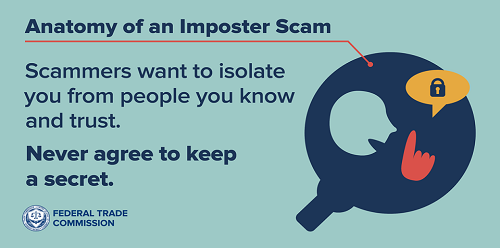You are the Gatekeeper for your money.
Scammers are exploiting people’s trust to get them to transfer their money and drain their retirement accounts to “protect” or “safeguard” or “legalize” it. The truth? If your money is stolen, a credit union, bank, or broker can’t get it back from the scammer.
Financial accounts don’t offer “zero liability” fraud protection.
You often hear that credit cards offer “zero liability” for fraudulent activity. While that’s true for credit cards, it doesn’t apply to your financial accounts. “Zero liability” for fraud does not apply to your credit union account, bank account, or investment account. You are the “gatekeeper” for your money. It’s important to work closely with your financial institution to protect the money in your accounts.
- If you are scammed into moving your money out of your account, you won’t be protected if it turns out to be a scam. And you probably won’t get that money back.
- If you transfer your life savings into a cryptocurrency wallet because someone told you to, it’s nearly impossible to get it back.
- If you liquidate your retirement account and hand the cash over to someone else, the financial institution will not reverse the transaction. No matter how much you need your life savings, it’s gone.
If someone tells you to move your money to “protect” it, that’s outright theft.
Remember:
- Slow down. If it involves your credit union account, bank account, retirement account, or life savings—STOP! Hang up the phone. Call your financial institution or broker directly using a number you KNOW is right — not the number the caller used or gave you.
- Tell someone. Scammers want to isolate you from people you know and trust. Never agree to keep a secret — especially if you’re scared and worried. Always tell a family member or friend you trust — they care and can help.
- Listen and share. A teller or manager might not know you, but they do know the signs of fraud. If they ask, share why you're withdrawing cash. Let them help you figure out what's really going on.
- Don’t lie. The scammer, who might even try to keep you on the phone, will tell you to lie, so the financial institution won’t stop your transfer. Do not lie to avoid the financial institution’s security department.
Remember, if you get a call, email, or text message from someone you think is trying to scam you, report it as soon as you can to your financial institution and contact the FTC at ReportFraud.ftc.gov.
Older Americans are sometimes targeted more often for these types of scams. NE PA Credit Union is proud to announce that we have earned the AARP Bank Safe Trained Seal in recognition of the training and policies we have in place to better protect older Americans from Financial Exploitation.
At NE PA Credit Union, we have a Risk & Compliance Specialist available to provide guidance to our members who may have experienced fraud or suspect fraud on their credit union account. Members can call 570-421-5585, ext. 1178, during regular business hours.
Source: ftc.gov
